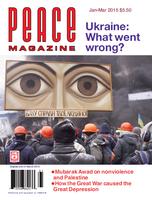
Peace Magazine Jan-Mar 2015, page 6. Some rights reserved.
Search for other articles by Erin Hunt here
On December 8th and 9th 158 states met in Vienna to discuss the effects of nuclear weapons. The Vienna Conference on the Humanitarian Impact of Nuclear Weapons follows two other such meetings in Oslo, Norway, in March 2013 and Nayarit, Mexico, in February 2014.
These conferences reflect the growing focus on the risks surrounding nuclear weapons—a topic now being explored in a number of fora. At the United Nations General Assembly First Committee in October, over 170 states signed joint statements on the humanitarian impact of nuclear weapons.
These discussions have shifted the conversation about disarmament. Many states and civil society organizations are calling for a treaty banning nuclear weapons in view of the unacceptable harm they cause. As of the end of November 2014, 57 states had called for the start of negotiations for a treaty banning the use, production, and possession of nuclear weapons.
Preceding the Vienna Conference, the International Campaign to Abolish Nuclear Weapons (ICAN) hosted a Civil Society Forum that brought together over 620 members of civil society from around the world. The participants spent two days delving deep into the harmful impact of nuclear weapons as well as military, political, and legal issues surrounding nuclear disarmament. The weekend made it clear that a ban on nuclear weapons is possible; civil society is strong, courageous, and committed to achieving a ban treaty. The depth of the panel discussions provided participants with the information necessary to challenge the idea of nuclear weapons as a guarantor of security and the workshop sessions provided tools for action.
Some of the most moving speeches came from survivors of nuclear weapons and nuclear testing. Setsuko Thurlow, a Toronto-based survivor of Hiroshima, shared her very personal account of surviving a nuclear detonation. Karipbek Kuyukov of Kazakhstan and Tony De Brum, the Marshall Islands Foreign Minister, brought the human impact of nuclear testing to the forefront.
Nuclear weapons are not as prominent an issue as during the Cold War and we are nearing 70 years since Hiroshima and Nagasaki, yet the survivor stories showed the personal, urgent need to eliminate these terrible weapons. The main message out of the Civil Society Forum is that a ban on nuclear weapons is coming and that civil society and like-minded states can lead the way.
The ICAN Civil Society Forum set the stage for the Vienna Conference on the Humanitarian Impact of Nuclear Weapons where government delegations and civil society members heard from expert panels for a day and a half before the floor was open for national statements. The opening session included strong statements from the Pope and the International Committee of the Red Cross. Setsuko Thurlow said,
“Here in Vienna let us move forward, courageously, by concretising our vision so that we can make the 70th anniversary of the atomic bombing of Hiroshima and Nagasaki the appropriate milestone to achieve our goal: to prohibit and eliminate nuclear weapons. Let us start this process, beginning with negotiations on a ban treaty, here and now in Vienna.”
The expert panels included Q&A and interactive debate portions to allow states to engage with the material and to gather more information. The panels on the first day dealt with the impact of nuclear weapons explosions, the risk of an intentional or inadvertent detonation of nuclear weapons, and response capacities in the case of a nuclear explosion. The second day panel had a “birds-eye view” of international law before the floor was open for general debate.
There were 100 speakers during the general debate. The overwhelming message was it is time to take action and start pursuing a legally binding instrument to prohibit the possession and use of nuclear weapons. The final document of the Vienna Conference was the Chair’s Summary, which summarized the discussion. In a surprise move the Austrian government issued a second document. In the “Austrian Pledge,” that government pledged “to stigmatise, prohibit and eliminate nuclear weapons in light of their unacceptable humanitarian consequences and associated risks.” Now other states can sign on to the Austrian Pledge. Will Canada sign?
Erin Hunt works with Mines Action Canada in Ottawa.

Peace Magazine Jan-Mar 2015, page 6. Some rights reserved.
Search for other articles by Erin Hunt here